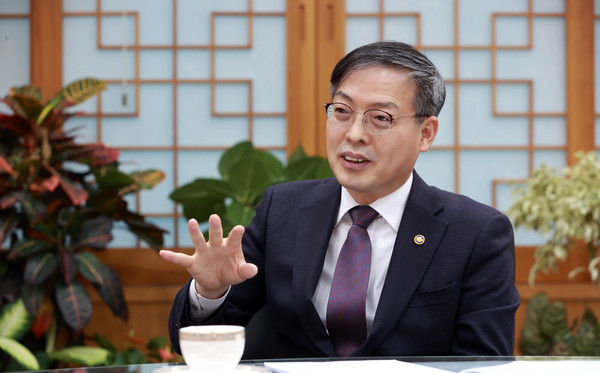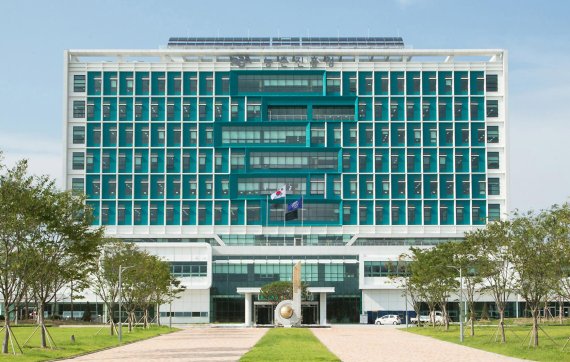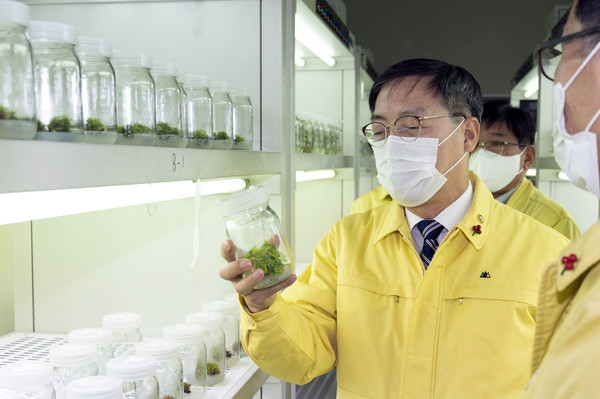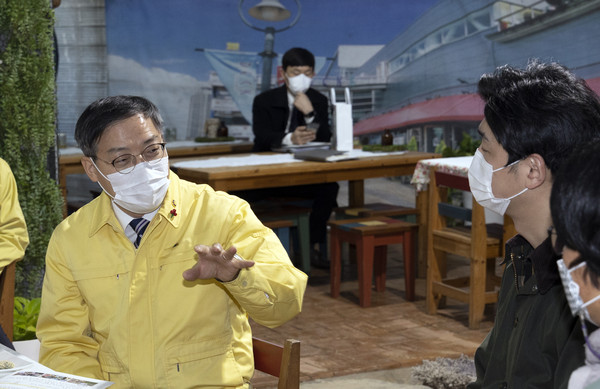Interview with Administrator Park Byung-hong of RDA celebrating the 60th anniversary
“The Rural Development Administration (RDA) is sharing the agricultural technology and experience accumulated over the past 60 years with developing countries in Asia, Africa, and Latin America to achieve the universal public values of 'hunger problem' and 'food security,” said Administrator Park Byung-hong.
Celebrating the 60th anniversary of the opening of the administration, Administrator Park said in an interview with The Korea Post, “The RDA is currently operating the KOrea Program on International Agriculture (KOPIA) in 22 countries to support customized technologies for each country. In addition, we are also operating 3FACIs (3 Food & Agriculture Cooperation Initiatives) by continent with 13 countries in Asia, 23 countries in Africa and 12 countries in Latin America to jointly resolve agricultural issues and to bridge the technological gap between countries.”

Administrator Park said, “As the first KOPIA project in Cambodia, we developed a new first-generation hybrid corn variety to support seed self-reliance. In Ecuador, the country of origin of potatoes, we transferred Korean seed potato production technology, and the farmhouse’s potato production increased by 40%. A soil environment information system was also established.
“Meanwhile, we are contributing to food security in Africa through the development and dissemination of multiplicity and high-quality rice in collaboration with the African Rice Research Institute. Along with the United Nations Food and Agriculture Organization (FAO) and 13 Asian countries, we jointly produced a map of Asian soil organic carbon."
The following are excerpts from the interview with RDA Administrator Park Byung-hong by The Korea Post media, publisher of 3 English and 2 Korean-language news publications since 1985.
Question: This year marks the 60th anniversary of the RDA opening. Please tell us in detail about your achievements so far and your plans for the future.
Answer: In response to new environmental changes and for the future happiness of the people and farmers, we will present a new future vision for the development of digital technology and AI-based future cutting-edge agricultural technology.
We will also focus all our capabilities to transform agriculture in crisis into agriculture in opportunity, and revive rural areas facing the crisis of rural extinction
RDA has contributed to the development of agriculture and rural areas through the Green Revolution that solved absolute poverty by developing high-yielding unified rice, the White Revolution that made it possible to produce crops year-round through plastic greenhouses, and digital agriculture that incorporates the 4th industrial revolution technology.
However, our agriculture and rural areas still face a number of challenges, such as the theory of rural extinction due to low fertility and aging, frequent abnormal weather due to climate change, and uncertainty in securing stable food.
We will seek ways to broadly utilize cutting-edge technologies such as AI and Metaverse in the agricultural field, and create synergy effects through role sharing and cooperation with the private sector.
Q: The RDA was selected as an excellent institution in the government work evaluation in 2021. Please briefly introduce yourself.
A: In this evaluation, RDA was selected as an overall excellent organization by receiving top evaluations in the fields of job government tasks such as creating new growth engines in agriculture, sustainable agriculture, enhancing rural vitality, and strengthening global cooperation with K-agricultural technology.
We received excellent evaluations in support of policies to create new growth engines in the agro-food sector, such as the transition to digital agriculture, carbon neutrality, and response to climate change.
RDA has been recognized for its leading role in creating jobs and creating a people-environment-oriented agricultural ecosystem, such as creating a healing agricultural base, supporting the settlement of young farmers, and responding to fruit-burning diseases.

K-agricultural technology for resolving agricultural and rural problems in developing countries has been selected as an 'Excellent Case for Public Sector Innovation' by the Organization for Economic Cooperation and Development (OECD), strengthening global cooperation in agricultural technology and receiving good evaluations in agricultural export technical support.
RDA will develop and disseminate agricultural technology based on governance that communicates with the public and farmers in order to lead the sustainable development of the agri-food industry while protecting the agricultural environment and to improve the quality of life of the people and farmers.
Q: Please tell us about the keynote and direction of agricultural R&D in the Yoon Suk-yeol administration, which will be inaugurated in May.
A: With a plan to expand R&D investment in various fields for the future agricultural industry, we will push for technical support for sustainable development of rural areas through support for young farmers and rural space creation, and expansion of R&D investment to solve current issues such as food security and carbon neutrality.
In addition, we will create synergy effects by expanding the division of roles and cooperation with the private sector.
The areas of focus include the future food industry, carbon neutrality, youth farming, companion animals, farmer welfare (safety), food sovereignty, eco-friendly livestock, and official development assistance (ODA).
Q: The development of digital agriculture technology for the realization of sustainable agriculture is accelerating. Please briefly introduce specific details.
A: By preemptively responding to the rapidly changing era of digital transformation, we will use cutting-edge digital technologies such as AI and metaverse to solve problems in agriculture and rural areas such as climate change, food problems, and the disappearance of rural areas.
This year, for the rapid on-site spread of digital agricultural technology, we established a strategy to use AI and metaverse technology widely in the agricultural field, and formed a task force (TF) of public and private experts to solve tasks applicable in various fields. We plan to actively discover and spread it.
Using the metaverse, such as the digital twin that allows people to farm in a virtual smart farm, and the healing farming experience, we will rapidly spread digital farming technology to the field. And farmers, universities, and private companies form a team to improve the productivity of crops and develop artificial intelligence. We plan to hold an AI contest in the agricultural field that develops and demonstrates.

When digital agriculture is introduced, it is possible to increase the convenience of farming for farmers with automation technologies such as drones, autonomous driving, and robots.
It helps to increase the productivity of farms by developing intelligent technology based on data such as environment, crop growth, and pests.
Q: Would you explain the implementation plan of RDA, such as the development of agricultural technology for carbon neutrality and early dissemination to the field.
A: After the government confirmed the national carbon-neutral scenario with the goal of achieving 2050 carbon neutrality in October last year, the Ministry of Agriculture, Food and Rural Affairs announced the ‘2050 Agricultural Food Carbon Neutral Promotion Strategy’ in December.
In line with this, RDA announced the ‘2050 Carbon Neutral Agricultural Technology Development and Field Distribution Promotion Strategy’ to actively support the promotion strategy established by the Ministry of Agriculture, Food and Rural Affairs.
The four key areas of the strategy are: ① Establishment of objective and reliable statistical data on greenhouse gas information ② Expansion of development of low-carbon agricultural and livestock technology to reduce greenhouse gas ③ Strengthening of greenhouse gas absorption function using agricultural land ④ Spread of developed technology in the agricultural field
Q: Interest in food security is growing due to the Ukraine crisis. What is the status of domestic varieties' royalty status, localization rate, and seed self-sufficiency rate, and what efforts are you making to develop excellent domestic varieties?
A: The localization rate of major horticultural crops is currently around 30%, and royalties are about 9.6 billion won.
As a result of everyone's efforts, the localization rate increased by 11 percentage points and the royalty payment decreased by 45% (8 billion won) over the past 10 years (2012 to 2021).
Conversely, the number of varieties that Korea receives royalties from abroad has continued to increase, earning about 2.6 billion won from 30 varieties over the past six years (2016-2021).
For the development of excellent varieties, the research direction has been changed from multi-variety development to market-oriented, and efforts are being made to develop varieties with high demands in the field.

Q: It is a time when rural extinction is being discussed. What do you think should be the basis for the sustainable development of agriculture and rural areas?
A: For the sustainable development of agriculture and rural areas, firstly, we will develop intelligent and automation-related technologies so that data-based advanced digital agriculture can be applied not only to smart farms but also to open-field agriculture.
Second, we will establish a support system for young farmers from the stage of technology start-up to the settlement of farming sites and provide support for stable settlement and customized education services for each stage of growth.
Third, we will expand the development and dissemination of domestic varieties and develop new varieties and cultivation technologies that are well adapted to climate change to support farmers so that they can farm with confidence.
Fourth, we will make a strong push for a rural space plan to intensively nurture regional specialized crops suitable for local conditions and environments to revitalize local agriculture, successfully establish healing agriculture that utilizes various agricultural and rural resources and create a pleasant and desirable place to live in rural areas.

